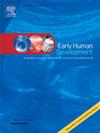Understanding developmental progress in young children: Exploring demographic and dietary influences through a cross-sectional study
IF 2.2
3区 医学
Q2 OBSTETRICS & GYNECOLOGY
引用次数: 0
Abstract
Background
Developmental surveillance is a crucial task aimed at monitoring and ensuring children's age-appropriate progression. However, demographics and dietary factors can significantly influence the developmental progress of young children.
Methods
We employed a cross-sectional study design, enrolling children aged 2–5 years from early childhood education settings. Their age-appropriate development was assessed using the Ages and Stages Questionnaires.
Results
Our study revealed that children demonstrated adequate development across all assessed domains. Notably, communication skills exhibited the highest mean score (Mean: 53.09, SD: 7.34) compared to other domains. Sex-based analysis revealed substantial disparities between young boys and girls, particularly in regard to fine motor and social-emotional skills, with differences exceeding 20 %. Additionally, fathers' education and socio-economic status were found to influence developmental outcomes. Fruit and vegetable consumption positively correlated with development, while dairy intake demonstrated a negative association.
Conclusion
This research underscores the significance of addressing developmental disparities related to sex and emphasises the necessity of investigating the role of the modern diet in child development, with specific attention to milk and dairy consumption.
了解幼儿的发育进展:通过横断面研究探索人口和饮食的影响因素。
背景:发育监测是一项重要任务,旨在监测和确保儿童的适龄发育。然而,人口统计学和饮食因素会严重影响幼儿的发育进程:我们采用了横断面研究设计,从幼儿教育机构招募了 2-5 岁的儿童。方法:我们采用横断面研究设计,从幼儿教育机构招募了 2-5 岁的儿童,并使用年龄与阶段问卷对他们的适龄发育情况进行了评估:研究结果表明,儿童在所有评估领域都得到了充分发展。值得注意的是,与其他领域相比,沟通能力的平均得分最高(平均值:53.09,标准差:7.34)。基于性别的分析表明,男孩和女孩之间存在巨大差异,尤其是在精细动作和社交情感技能方面,差异超过 20%。此外,父亲的教育程度和社会经济地位也对发育结果产生影响。水果和蔬菜的摄入量与发育呈正相关,而乳制品的摄入量则呈负相关:这项研究强调了解决与性别有关的发育差异的重要性,并强调有必要调查现代饮食在儿童发育中的作用,特别关注牛奶和乳制品的摄入量。
本文章由计算机程序翻译,如有差异,请以英文原文为准。
求助全文
约1分钟内获得全文
求助全文
来源期刊

Early human development
医学-妇产科学
CiteScore
4.40
自引率
4.00%
发文量
100
审稿时长
46 days
期刊介绍:
Established as an authoritative, highly cited voice on early human development, Early Human Development provides a unique opportunity for researchers and clinicians to bridge the communication gap between disciplines. Creating a forum for the productive exchange of ideas concerning early human growth and development, the journal publishes original research and clinical papers with particular emphasis on the continuum between fetal life and the perinatal period; aspects of postnatal growth influenced by early events; and the safeguarding of the quality of human survival.
The first comprehensive and interdisciplinary journal in this area of growing importance, Early Human Development offers pertinent contributions to the following subject areas:
Fetology; perinatology; pediatrics; growth and development; obstetrics; reproduction and fertility; epidemiology; behavioural sciences; nutrition and metabolism; teratology; neurology; brain biology; developmental psychology and screening.
 求助内容:
求助内容: 应助结果提醒方式:
应助结果提醒方式:


